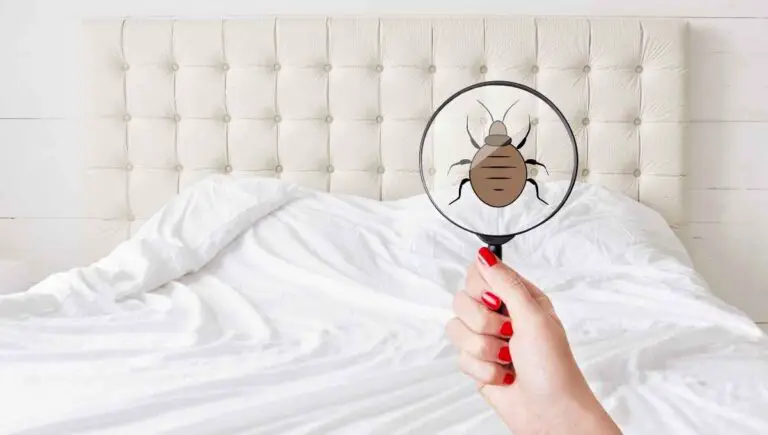How to Keep Spiders Away While Sleeping

A good night’s rest is crucial for normal functioning, but not all of us sleep for the recommended six-to-eight hours. You’re not alone if you constantly toss and turn, worried about being visited by a slew of uninvited eight legged guests. Many people lose countless hours wondering how to keep away spiders while sleeping.
For those of you that are frightfully scared by these eight legged foes, the idea of sharing a bed with a spider, or worse, swallowing one whole, is the stuff of nightmares.
In this post, we’ll teach you how to remove unwanted spiders and, in turn, reclaim lost sleep.
Why Are Spiders Attracted to Beds?
Spiders don’t intentionally enter your house, seeking out your bedroom to enjoy a nap on your cozy pillows. Instead, a spider might crawl under the bed sheets by accident, when following their prey from room-to-room.
However, the conditions of a bedroom will appeal to creepy-crawlers, especially when you turn in for the night. Being the nocturnal creatures that they are, spiders thrive in darkness, such as under the layers of your blankets and sheets and the gloomy spaces below the bed where very little light penetrates.
How To Keep Spiders out of Your Bed and Prevent a Spider Invasion
An arachnid first has to gain entry into your house, before it can crawl its way into your room. A way to prevent this from happening is to block all possible entryways by spider-proofing.
Spiders running rampant in a room probably means that the rest of the home, bathrooms, garden, basement, and garages are teeming with the tiny dwellers. Most homes in America have at least four species at any given time.
You might have felt panic reading the above statistic, but it’s important to note that spiders play a pivotal role in controlling insect populations. Without them, we’d be spending our lives reaching for fly swatters and mosquito repellents attempting to kill these pests that are not just annoying but spread diseases.
Your focus should be on spider management and control, and not killing every arachnid you don’t like the look of.
Tips on How to Keep Spiders Away From Your Bed and Out of Your Home
Cover Holes With Sealants
Keep unwanted spiders from your home and garage by sealing all openings to your home such as small holes in the walls and roofs using a special adhesive like caulk.
Caulk prevents bugs from entering your home by filling in cracks and gaps around the house.
Cover All Possible Openings to Your Room
Their size allows these tiny fanged-creatures to crawl through the unlikeliest of spaces, including:
Keyholes
Place a small piece of cardboard in the keyhole or scrunch up some loo paper to prevent uninvited roommates from entering your private space.
Under the Door
Cover the gap between the door and the floor with a wind sweep. A wind sweep, made from silicone material, is easy to apply and works effectively. If you don’t have one lying around your garage, wind sweeps are inexpensive and accessible from most hardware or convenience stores in America. Not just a barrier against bugs, sweeps help insulate the room by keeping warm air in or cold air out.
Windows
Keep your windows tightly shut, especially if you live on the ground floor and near a garden. By leaving them open when you sleep, you’re practically inviting your eight-legged roommates for a midnight visit. Consider installing protective screens over your windows if you need to keep them ajar on hot and balmy nights.
Household Chores to Get Rid of Spiders in Your Bed

Vacuum
Just like they’re attracted to dark and dank areas, spiders love hiding among dust and clutter. Therefore, the best way to deter spiders (and other pests like roaches) is to keep a clean house, starting with a thorough vacuuming.
While vacuuming, it’s crucial to clean those hard-to-reach crevices and corners because these are popular spider hangouts, in the dark and debris-filled corners far removed from humans.
Change the Sheets
Regularly changing the sheets is also recommended not only because it’s hygienic, but to ensure that creepy crawlies keep their distance. You shed dead skin cells as you sleep. While you won’t know they’re there because they’re microscopic, these cells will accumulate, along with other debris, grime, and dirt.
These unsanitary conditions attract insects, such as bed bugs, which in turn, draw hungry spiders in.
Wash Your Sheets in essential oils
Spiders hate the scent of essential oils and will avoid entering a space that smells like peppermint, lavender, citrus, or cedarwood.
Eat Away From the Bed
Eating pizza in bed while binge-watching series on Netflix does sound like the perfect way to unwind after a stressful workday. But before you tuck into your next cheesy slice, think about the crumbs you’re leaving behind that are sure to attract ants, and worse, their terrifying predators.
Instead, stick to eating in the kitchen, unless you’re sick or physically unable to take your meals elsewhere.
Reposition Your Bed
Move your bed away from the wall where eight-legged arachnids are crawling about and weaving webs on your ceiling. It’s also a good idea to elevate your bed stand off the ground because doing so makes climbing to your bed challenging for spiders. Not only that, but a raised bed might also prevent an army of spiders from nesting under it too.
It will be worth your while to purchase bed legs. A bed that’s low to the ground will attract a spider who’s seeking out a warm and dimly-lit refuge.
Declutter
Are you guilty of throwing used clothes on the floor out of laziness? Do you keep your shoes and other knickknackery under your bed because there isn’t space elsewhere?
If you do, don’t shriek out in surprise when you find a sleepy arachnid hiding in your dirty pile of laundry or inside a shoe. Spiders will thrive where there is mess and clutter. Keep your shoes out of an arachnid’s path if you don’t want a nasty bite on your big toe.
If you don’t have enough space for your shoe collection, consider purchasing a collapsible shoe wrack that can easily fit inside a cupboard. Place books collecting dust inside empty boxes (if you have a future use for them) to keep spiders out of your personal belongings.
How to Repel Spiders from Your Bed Using Natural Methods
One way to repel a spider is to think ahead. At this moment, you might have tiny household invaders who have established themselves in your home without your knowledge and certainly not with your permission.
They live, reclusively, in the shadows during the day, hiding and keeping out of the way of humans. At night, though, you might hear them scurrying around after prey as you lie awake worrying where they are, how close they are to you, and whether or not they’ll bite you.
Essential Oils
Essential oils are natural repellents that’ll help prevent sleepless nights in the future. Pure peppermint oil is popularly used because it contains natural insecticide components that repel creepy-crawlers without harming us or our pets.
No one knows with certainty why spiders hate the strong scent of peppermint and similar fragrances. However, some studies have shown that the organic chemical, d-limonene, found in most essential oils deters spiders and various other pests that make your home and bedroom theirs.
To make the repellent, fill a spray bottle with water and add a few drops of your chosen essential oil and spray around and under your bed, your headboard, bed legs, and along the window panes. It’s safe to combine a few essential oils to increase the solution’s potency against spiders and bugs.
That said, if you do use peppermint oil, remember to spray well before bedtime, the smell energizes the body, which is the last thing you want when turning in for the night.
Essential oils will not only keep spiders at bay but also rejuvenate the body and instill wellness. Their scents, which spiders hate, are incredibly healing for us. Reduce stress, boost your energy, increase your immunity, and curb insomnia using an array of healing oils.
Nuts – Fact or Fiction? You Decide
There’s a divided belief as to whether chestnuts and conkers repel spiders or if it’s an old wives tale with no grounding in science. The jury is out on this one, but no harm is caused by scattering nuts under furniture, on windowsills, and near to spider-populated areas.
Vinegar
Vinegar might enhance the taste of French fries or a salad, but it’s not exactly the type of smell that lulls you to sleep at night. That said, if other natural repellents haven’t been effective for you, vinegar might do the trick.
Along with its acrid taste and smell that spiders hate, acetic acid found in vinegar can be lethal for hairy-legged foes. Leave a solution of vinegar and soap on a plate on the windowsill and other hiding spots positioned away from your bed.
Non-Kill Methods of Removing Spiders from Houses
We can all agree that an uncontrollable swarm of spiders isn’t just problematic but outright terrifying and needs to be forced out. However, think twice before you decide to squash a little cretin to death because it might just be lost and more than likely, non-venomous.
Spiders in the home are nature’s pest control; without them, you’d be plagued by infestations of various pests with your personal spaces becoming unlivable.
That said, if the idea of breathing in the same air as an arachnid is more than you can handle, remove them using the below methods.
Open a Window
If you spot a spider near a window, the chances are that the arachnid plans to exit your home anyway, which is something you want.
Rather than squishing it with a newspaper, let the creature out by opening the window. Remember that spiders are more scared of you than you are of them, so the probability of them scuttling off in the opposite direction is high.
Block their path with a piece of cardboard or anything long and flat and, slowly and gently, guide the arachnid to the exit point.
The Glass and Paper Method
Trap spiders on flat surfaces using a glass. Approach slowly, fast movements will scare them away. Once you’ve got the spider, slide a piece of paper under the glass. Make sure that the paper covers the surface of the cup to prevent the creepy crawler from escaping when you lift the glass.
Once lifted, place your one hand under the paper with your other firmly grasped around the rim of the glass and then release it back into the wild by an open window or door.
Sweep In a Dustpan
If a spider’s on the floor, sweep it up with a brush and pan. Go outside, lower the pan to the ground and get the arachnid to move by tapping repeatedly the underside. Incy Wincy will dislike the constant vibrations and clear off.
How to Keep Spiders out of Your Bed Using Store-Bought Sprays

Chemical pesticides aren’t always the answer to removing unwanted bugs, especially not within confined living quarters where the chances of them being ingested or breathed in are much higher, and there’s no guarantee that these chemicals actually work on the targeted species.
Spiders are hardy creatures that can only be killed upon contact, i.e., by spraying it directly – this is no mean feat, considering how fast arachnids can move out of the way.
Not just hardy, they’re also fascinating creatures. They can sense taste, smell, and movement through the hairs on their legs. Their senses are so acute that if they detect a fragrance they don’t like, say the cloyingly sweet smell of ant or fly traps; they won’t walk over it. And even if they traipse over a sticky surface, their abdomens, which is the more vulnerable parts of their body, are protected by their long legs.
However, if you have tried all other methods without much success, these Amazon products come highly recommended.
Ultrasonic Pest Repeller Electronic Plug

If you can’t stand the lingering chemical smell of pesticides in your bedroom, Ultrasonic repellents are the next best thing.
The idea behind the device is that ultrasound frequencies, not chemicals will have an entire array of pests running for cover. These sounds won’t keep you awake because they’re inaudible to humans and your furry four-legged family members (the kinds that are welcome in your home).
Can the Ultrasonic Pest Repeller Electronic Plug effectively drive invaders away? Nothing is guaranteed, but as mentioned earlier on, spiders have highly responsive senses. Spiders perceive sound and movement as vibrations. Unless they’re hunting and can sense their prey’s heartbeat, arachnids regard foreign vibrations as dangerous and tend to run away.
Features of Ultrasonic Pest Repeller Electronic Plug
- The product uses electromagnetic wave and ultrasonic wave technology to create a pest-free home. Say goodbye to rodents scampering across your roof, roaches in your trash, itchy mosquito bites, and scary-looking spiders living in your bedrooms.
- Air-powered source
- Non-toxic, chemical-free, and safe to use around pets and young children. Makes an environment inhospitable for pests but not for your family!
- It provides extensive coverage of up to 1900 Square feet (please note the device can’t penetrate walls).
- Just plug it in and it starts working. No need to refill!
How it works:
Plug into an outlet and adjust your settings.
Syngenta 73654 Demand CS Insecticide (8oz)

The Syngenta 73654 Demand CS Insecticide (8oz) has received high praise from many. It’s a powerful odorless insecticide that can be used in the perimeter of the bedroom. Spray in cracks and crevices but not on furniture, the mattress, or areas that you’re likely to touch.
Features:
- Doesn’t leave behind residue
- Long-lasting – 8oz makes 8-40 gallons
- Kills bedbugs, cockroaches and spiders
Miss Muffet’s Revenge

Miss Muffet’s Revenge is specially formulated to kill pesky spiders on contact and to keep future pests out of your house for up to 12 months with one application. It’s suitable to use in all areas of the house, including high places where creepy-crawlers are known to hang out.
Miss Muffet’s secret weapon is its sprayer, which is more precise than many other products on the market and can reach a distance of up to 10 meters.
Features:
- Efficient sprayer and coil system that delivers a wide ‘spray.’
- Only one application needed to prevent cobwebs from reappearing.
Not Much of a DIY’Er? Professional Pest Control Will Know How to Repel Spiders From Your Bed
Call in the professionals if you’ve failed to remove a major spider infestation using alternative methods and are nervous about handling toxic chemicals, not to mention confronting possibly dangerous arachnids that you don’t know much about.
Your local pest control company will inspect your house, including your bedroom, to identify the source of the issue and to customize a treatment plan for you.
When in doubt, leave spider extermination to the professionals and stick to fun DIY projects instead!
Debunking Myths About Spiders
We run the risk of swallowing spiders while we sleep: FALSE
Online, you might’ve read horrifying facts about the number of spiders you’ll eat in your lifetime, which is 52…apparently. But these claims are baseless in reality.
A person at rest is terrifying to a spider due to the vibrations let off. With intermittent snores, not to mention the involuntary moans and movements we make while slumbering, an arachnid is likely to view a sleeping human as a threat and will choose to stay well away.
The chances of a spider crawling over your body to reach your open mouth are then minimal. You might hear about horror stories about people waking up with a spider leg dangling from their lips, but these accounts are uncommon and go against a spider’s nature.
Spiders Will Bite Me When in Bed: ALSO FALSE
The chances of this happening are again low because, as mentioned earlier, you’re seen as dangerous to spiders in your restful state.
A spider might attack if you roll onto it in your sleep, but the breed’s fangs are probably too small to cause any significant damage. In saying that, if the spider is trapped under the sheets, it’s unlikely to have direct contact with your skin if it does bite.
There might be times where a spider seeks shelter in your bed, but typically prefers to hang out in human-free zones and won’t be a danger to you at all.
It’s estimated that over 30.5% of Americans are afraid of spiders and that many harmless arthropods are unnecessarily killed because of the paranoia caused by arachnophobia.
Sleep easy, knowing that the likelihood of eating a spider or being attacked by one when you aren’t awake is improbable. Unless these web spinners have spun one too many messy webs or are considered extremely harmful to humans, leave them to catch flies undisturbed.
Recap: How to Keep Spiders Away and Repel Them From Your Bed
Have you ever encountered a spider at close range when you’re getting ready to sleep? It’s understandably an unsettling experience. Learn what to do in these situations and how to prevent these unpleasant run in’s from happening again, by:
- Keeping your bedroom clean and dust-free. Running a tight ship will keep allergies and spiders away! Change the sheets, vacuum every floor’s surface, and learn to declutter.
- Keep spiders out by blocking their entryways to your home – fill in cracks and holes with high quality and lasting sealants.
- Spider’s hate strong-smelling aromas; use this to your advantage. Spray your bedroom with natural repellents, such as essential oil. Sleep soundly in a pest-free space while breathing the calm-inducing aromas of essential oils.
- Don’t destroy anthropods unless it’s necessary – use non-kill methods to release the occasional spider into the wild.
- Know your foe – your eight-legged foe might freak you out, but imagine how you might look and sound to them! Humans emit so many noises and vibrations that terrify creepy crawlers, so the chances of swallowing a spider or being attacked while your defenses are down are unlikely.
- Use chemical sprays sparingly and buy products from a verifiable source, such as Amazon.com.
- Call in the professionals if you come across spiders that you can’t identify or if you have an out-of-control infestation







